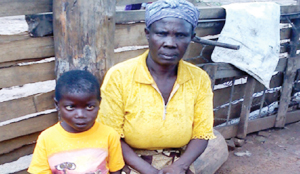By GETHSEMANE MWIZABI-
FROM a distance James Mwila looks just like any other child, friendly and with an appealing smile, which is so hard to ignore.
But as you get close to him, you begin to notice something unusual about him. This is child with a pleasant personality, yet his condition rebuffs his peers.
His condition is not something he is responsible for because he was born that way.
The laughter and mocking from fellow children in the community cuts deep in his soul and is a huge assault on his self esteem.
Everything comes down to his condition; urinary and feacal incontinence, the involuntary release of feacal matter and urine. In a day, it happens six times.
And when it happens, fellow children run around and mock the innocent child for the condition he has had from birth. He was born that way.
James lives with his grandmother Rhoda Kanyanta, 67, in one of Ndola’s poorest communities of Mackenzie Township where poverty and hunger are a daily experience.
Ms Kanyanta, who looks after 13 children under one roof, labours in other people’s fields for only K50.
As for James, he is an orphan. He was born in 2002 with a condition that has also inhibited his growth, making him look like a four-year-old child.
His testicles do not protrude as with a normal person. His mother died while he was still a baby and does not know his father.
“He used to live in Kasama with relatives but I was not happy with the treatment he was getting. So I sent for him,” says Ms Kanyanta, a widow.
She is appealing to well-wishers to help her grandchild, who also has an eye problem which causes him not to see very clearly.
Due to his condition, his friends have been stigmatising him as he smells of faeces and urine.
Like every child he has hopes and dreams but his condition has been a major drawback.
He would wish to be in school, but the condition has deprived him opportunities to receive education which he needs to have a better future.
“I want to start school. I also want to be in class,” he says with a little smile.
There is no doubt he needs special treatment as soon as yesterday.
In Ndola, doctors have advised the grandmother to take him to Lusaka. As at now, she cannot afford the amount of money which is required for treatment.
The terms soiling and encopresis were often used interchangeably and both have now been replaced by the general term faecal incontinence to define the passage of stools in an inappropriate place.
According to health journals, Faecal incontinence can be either organic, as a result of neurological damage through trauma or congenital conditions such as anal sphincter abnormalities, or functional in origin.
The definition of faecal impaction is constipation with a large faecal mass in the rectum or the abdomen that is unlikely to be passed spontaneously.
When stools are difficult or painful to pass, a child may be reluctant to defecate and ‘holds on’ to the stools by contracting the external sphincter. The brain then begins to ignore the signals that would usually alert a child to the need to release oneself and the stools build up in the rectum and colon.
This can result in the child passing large stools very infrequently, causing further pain and even anal tears; there may also be overflow diarrhoea, as a result of watery faeces leaking around the harder stools.
As in the case of little James, the child has no control over this and will often be unaware of the soiling. This can happen up to 10 times a day and it can be difficult for parents to accept that there is an underlying constipation when stools appear so loose.
Further, faecal incontinence is sometimes perceived as being a behavioural problem, leading to parents and children feeling that they are somehow to blame.
The associated shame and embarrassment can lead to avoidance of social situations and feelings of isolation, often for the whole family.
James surely needs help.







